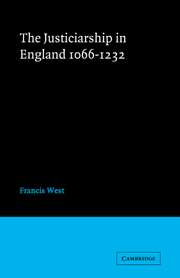Book contents
- Frontmatter
- Contents
- List of Abbreviations
- Introduction
- I THE ORIGINS OF THE JUSTICIARSHIP
- II THE JUSTICIARSHIP UNDER HENRY II
- III THE JUSTICIARSHIP UNDER RICHARD I
- IV THE JUSTICIARSHIP UNDER JOHN: BEFORE THE LOSS OF NORMANDY
- V THE JUSTICIARSHIP UNDER JOHN: AFTER THE LOSS OF NORMANDY
- VI THE JUSTICIARSHIP IN JOHN'S LAST YEARS
- VII THE JUSTICIARSHIP UNDER HENRY III
- Bibliography
- Index
III - THE JUSTICIARSHIP UNDER RICHARD I
Published online by Cambridge University Press: 08 January 2010
- Frontmatter
- Contents
- List of Abbreviations
- Introduction
- I THE ORIGINS OF THE JUSTICIARSHIP
- II THE JUSTICIARSHIP UNDER HENRY II
- III THE JUSTICIARSHIP UNDER RICHARD I
- IV THE JUSTICIARSHIP UNDER JOHN: BEFORE THE LOSS OF NORMANDY
- V THE JUSTICIARSHIP UNDER JOHN: AFTER THE LOSS OF NORMANDY
- VI THE JUSTICIARSHIP IN JOHN'S LAST YEARS
- VII THE JUSTICIARSHIP UNDER HENRY III
- Bibliography
- Index
Summary
Henry II, whether he was in England or in his continental dominions, kept a firm grip upon the administration of his kingdom. So far as one can perceive his character, with the mastery of his lands there went a close and sustained interest in the details of their government. His justiciars were men who, being of some feudal stature and devoted to royal interests, were under constant supervision by the king himself; there was never any doubt that their greatness was conditional upon royal greatness. The relationship of the king and his justiciar obviously determined the importance of the justiciarship, and whatever view be taken of Henry's personality or those of de Luci and Glanville a new king meant a different relationship and therefore a different justiciarship. Richard was a man of different calibre from his father. Of the same imperious stamp, he was nevertheless not interested in the administrative detail of government so long as his will was realized. His reputation and chief interest were warlike, and his immediate aim, upon his succession, was the crusade. The new king's preoccupations allowed greater scope to his justiciars. This lack of sustained interest in government meant that their place became the more important, especially when royal demands for money necessitated intense administrative activity. His continuous absence also offered his justiciars greater responsibility, not merely for ensuring that the machinery of government ran smoothly but also by offering them somewhat greater scope for deciding the policy which would achieve the king's desires.
- Type
- Chapter
- Information
- Justiceship England 1066–1232 , pp. 64 - 96Publisher: Cambridge University PressPrint publication year: 1966

